Episcopal Church
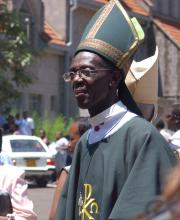
The Anglican Church in Kenya has become the latest province to announce it will boycott the Anglican Consultative Council meeting in Zambia over the participation of the Episcopal Church. The Episcopal Church was recently censured at a primates’ meeting in Canterbury, England, because of the American church’s willingness to ordain and marry LGBT people. According to the sanctions, the Episcopal Church cannot represent the communion at the April meeting or vote on doctrine and polity.
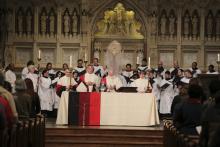
THE ANGLICAN COMMUNION is a beloved, global, traditional, innovative, challenging, frustrating, and sometimes very confusing institution. A lot like families I know.
On Jan.14, a majority of the Anglican senior leaders voted that, for a period of three years, no one from the Episcopal Church’s 109 dioceses in the United States and 17 other countries may “[any] longer represent us on ecumenical and interfaith bodies, should not be appointed or elected to an internal standing committee, and that while participating in the internal bodies of the Anglican Communion, they will not take part in decision making on any issues pertaining to doctrine or polity.”
This action came in response to a decision made by the Episcopal Church last July to remove its canonical language that confines marriage to unions between a man and a woman and authorizes two new marriage rites with language for use with same-sex or opposite-sex couples.
Yet the Anglican leaders also unanimously expressed their desire to “walk together in the grace and love of Christ” as this process unfolds.
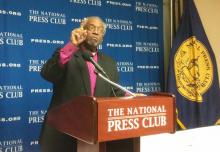
Episcopal Church Presiding Bishop Michael Curry is describing the recent censure of his church over allowing clergy to perform same-sex marriages as a “fair” move by the wider Anglican Communion. Anglican primates voted last month in Canterbury, England, to remove the Episcopal Church from votes on doctrine and to ban it from representing the communion in ambassadorial relationships for three years.

Archbishop of Canterbury Justin Welby, the “first-among-equals” leader of the world’s Anglican churches, has published his reflection on the 2016 Primates Meeting. The Jan. 11-15 meeting of the leaders, or primates, of the Anglican Communion ended with a three-year suspension of The Episcopal Church’s right to represent the Anglican Communion on interfaith or ecumenical bodies and vote on doctrine and polity because of The Episcopal Church’s unilateral decision to recognize same-sex marriage.

Restoring the Bible to the heart of the Anglican Communion should be the goal of a meeting called this week by Archbishop of Canterbury Justin Welby on how Anglicans should move forward, said the head of the Global Anglican Future Conference.
Welby’s meeting of Anglican leaders is planned for mid-January 2016 in Canterbury, England. It is being viewed as an attempt to heal the 80 million-member communion, which remains deeply wounded by disputes over homosexuality and women’s ordination in the global church.
GAFCON’s chairman, Archbishop Eliud Wabukala, the primate of Kenya, said the meeting was a recognition of the deep concerns of the faithful Anglican Church leaders in the world. GAFCON, started in 2008 in Jerusalem, says its aim is to restore the integrity of the Anglican faith and order.
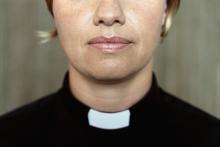
In an interview that aired last week, Stephen Colbert — possibly the only Catholic whose popularity rivals Pope Francis himself — admitted that one of the times the Eucharist felt “most real” to him was when he attended an Anglican service and heard a woman consecrate the bread.
“The freshness of hearing a woman say that gave the message a universality that it always should have,” said Colbert.
Today, if you walk through the red doors of an Episcopal church on Sunday morning, the person presiding over the Eucharist might be female, gay, lesbian, bisexual, or transgender. But on Sept. 12, some of the first women ordained as Episcopal priests reminded the church: it hasn’t always been that way.
Forty years ago last week — before women were allowed to be priests — four women were "irregularly" ordained as Episcopal priests before the altar of St. Stephen and the Incarnation in Washington, D.C. Closely linked with the "irregular" ordination of eleven women in Philadelphia (the “Philadelphia Eleven”) the previous year, the ordination of the Washington Four — Lee McGee Street, Alison Palmer, Betty Powell, and Diane Tickell — is seen by many as a key step in securing women’s ordination in the Episcopal Church.
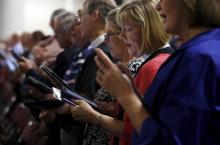
By an overwhelming majority in both of its legislative houses, the Episcopal Church made history July 1 by making marriage for same-sex couples available throughout the church.
The actions on marriage equality came after decades of progress toward fully including LGBT Episcopalians in the work and witness of the church.
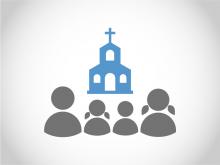
When did you last think about the relationship between your community's worship practices and their missions? It's such a loaded conversation. What makes for "mission?” Why do we set the two practices — what we do in worship and what we do after — at odds with one another? Is it simple geography? One happens behind the ecclesial closed doors while the other is more public? I want to know when we lost the sense that our liturgies were public events rather than secret rites. But that's another post.
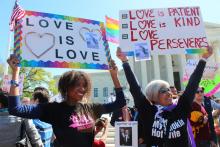
People who argue against marriage equality frequently do so for religious reasons, even if they cast their argument in secular terms. While I believe there are strong constitutional arguments for striking down bans on marriage equality, I support striking down these bans because of my faith, not in spite of it.
For too long, religious institutions have contributed to the scourge of homophobia that fuels the discrimination that this case seeks to strike down. Far too many of us are familiar with the discrimination, fear, and violence that gay and lesbian people have suffered while people of faith turned a blind eye or, worse yet, acted as perpetrators.
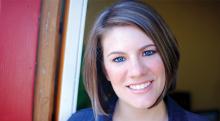
Rachel Held Evans has grown into a powerful voice in American Christianity, first as the author of Evolving in Monkey Town and later with the New York Times best-seller A Year of Biblical Womanhood. Those who follow her writings often note that her thinking has become increasingly progressive, especially on hot-button theological issues such as gender and sexuality. That shift culminated in her leaving evangelicalism for the Episcopal Church.
Next month, Evans will release Searching for Sunday: Loving, Leaving and Finding the Church, a book that oscillates between stinging critiques of American Christianity and prescriptions for how she believes believers can more faithfully participate in church life. In an interview with Religion News Service, she talked about the key to revitalizing the church and defended her exit from evangelicalism. Some answers have been edited for length and clarity.
Q: You say that the way to stop the exodus of millennials from churches isn’t cosmetic changes like better music, sleeker logos, and more relevant programming. Why are these methods ineffective?
A: These aren’t inherently bad strategies, and some churches would be wise to employ them. But many church leaders make the mistake of thinking millennials are shallow consumers who are leaving church because they aren’t being entertained. I think our reasons for leaving church are more complicated, more related to social changes and deep questions of faith than worship style or image.
If you try to woo us back with skinny jeans and coffee shops, it may actually backfire. Millennials have finely tuned B.S. meters that can detect when someone’s just trying to sell us something. We’re not looking for a hipper Christianity. We’re looking for a truer Christianity.
Q: If these aren’t the answer, what is?
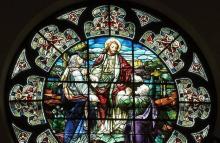
For the second time in as many months, a state court has sided with a group of breakaway Episcopalians, ruling that they can keep their property after leaving the national church in 2008 over sharp differences on homosexuality and the authority of Scripture.
Judge John P. Chupp of the 141st District Court in Tarrant County, Texas, ruled March 2 that more than 60 parishes in greater Fort Worth can retain their property and remain independent of the Episcopal Church.
“We are grateful for the ruling in our favor,”said Bishop Jack Iker, the former Episcopal bishop of Fort Worth who’s now affiliated with the Anglican Church in North America, which formed in 2009 as a rival to the Episcopal Church. “It’s clear that both church laws and Texas laws have been rightly applied to this dispute.”
While still a part of the Episcopal Church, Iker was a leader of the church’s small conservative wing that opposed the 2003 consecration of an openly gay bishop and blessings for same-sex unions. He’s also criticized the theology of Presiding Bishop Katharine Jefferts Schori as unorthodox, and he refers women seeking ordination to a neighboring diocese.
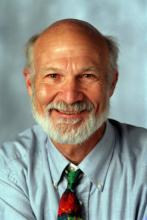
Theologian Stanley Hauerwas has declined a series of lectures he was scheduled to give at New York’s General Theological Seminary in November in the wake of the crisis roiling the school.
On Oct. 8, the Christian ethicist said he does not want to get in the middle of a controversy involving the resignations or firings of eight faculty.
Two weeks ago, the eight faculty members quit teaching classes and attending official seminary meetings or chapel services until they could sit down with the Board of Trustees.
Hauerwas, who is professor emeritus of divinity and law at Duke Divinity School, said he pulled out of the lecture series so he would not appear to take a side.
“I was looking forward to going because I’ve known of General for my whole academic life, but I had never been there. At one time, it represented a commitment to an Anglo-Catholic tradition with which I’m very sympathetic,” said Hauerwas, who attends an Episcopal church in Chapel Hill, N.C. “I think the situation is one of deep pathos; it’s just pathetic. I’m sorry that I’ve gotten caught in it.”
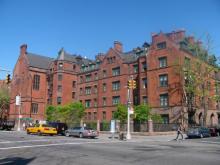
General Theological Seminary’s campus in the Chelsea neighborhood of Manhattan is everything you’d want in an urban seminary.
Handsome buildings, a chapel at the center, quiet walkways in a noisy city, calm places to read and pray. All serving a wonderfully diverse student body eager to minister in a changing world.
It’s like the best of historic church properties: harking back to a day of noble architecture and tradition and yet looking outward to a frenetic city and changing religious environment.
Why, then, is GTS on the verge of financial collapse and, now, paralyzing internal conflict? Its dean is under attack, 80 percent of its full-time faculty were dismissed, its board is floundering — all in the glare of press and blogosphere.
Why? For the same reason that historic churches and denominations are trapped in “train wrecks.” Their time has passed.

Several faculty members at the Episcopal Church’s oldest seminary are battling with the school’s leadership, although neither side agrees whether they quit, were fired or staged a walkout.
General Theological Seminary in Manhattan is the only seminary overseen by the national church. Last week, eight faculty decided to stop teaching classes, attending official seminary meetings or attending chapel services until they could sit down with the Board of Trustees.
The dean and president, Kurt Dunkle, wrote a letter to students saying the Board of Trustees’ accepted the eight faculty members’ resignations. But faculty member Andrew Irving wrote to students saying the professors never suggested they would resign.
“We wish to underline that we have not resigned,” Irving wrote, suggesting the group sought legal counsel. “Our letters did not say that we would resign. We requested meetings with the Board.”
The Rev. Ellen Tillotson, an Episcopal priest in Connecticut and a GTS board member, wrote that it has become clear that the eight faculty have been planning a walkout.

Episcopal Church Presiding Bishop Katharine Jefferts Schori, the first woman elected to head a national branch of the worldwide Anglican Communion, announced Sept. 23 that she will not seek a second nine-year term in office.
Her departure will likely set off debates over her legacy and the future of the 2 million-member denomination.
“I believe I can best serve this church by opening the door for other bishops to more freely discern their own vocation to this ministry,” Jefferts Schori, 60, said in a statement. “I will continue to engage us in becoming a more fully diverse church, spreading the gospel among all sorts and conditions of people, and wholeheartedly devoted to God’s vision of a healed and restored creation.”
Her 2006 election was celebrated as a breakthrough for women leadership in the church; delegates sported pink “It’s a Girl!” buttons after the vote. She remains the only female primate in the Anglican Communion, but last year the Evangelical Lutheran Church in America followed suit and elected its first female presiding bishop.
Jefferts Schori’s current term will end at the conclusion of the Episcopalians’ General Convention in Salt Lake City in June 2015. Church membership during her term has dropped by 12 percent, according to the most recent statistics available from the denomination.
Jefferts Schori’s time as presiding bishop has been lauded by theological liberals and bemoaned by conservatives, but both breakaway Anglicans and Jefferts Schori were instrumental to one another’s rise.
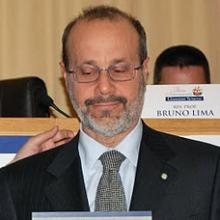
The Church of England’s vote to allow female bishops threatens unity with the Catholic Church, according to the editor of the Vatican newspaper, L’Osservatore Romano.
Giovanni Maria Vian, who is also a Rome historian, on Tuesday said the decision would have “an extremely negative impact” on steps to bring the churches closer together despite a positive meeting between Archbishop of Canterbury Justin Welby and Pope Francis a month ago.
“Clearly it’s a decision that complicates the ecumenical path,” Vian said in an interview with the Italian newspaper La Stampa published on Tuesday. “The problem is not only with Rome but also with Orthodox Churches, and that the Anglican Church is itself divided on the issue.”
After nearly 20 years of debate, the Church of England’s General Synod voted Monday to permit women priests to be ordained as bishops, overturning centuries of tradition in a church that has been deeply divided over the issue.

After 20 years of turmoil and angry debate, on Monday the General Synod of the Church of England said “yes” to women bishops.
The first could be named by the end of the year with the appointment of at least three additional women sometime in 2015, say senior church officials.
The General Synod is the three-tier governing body of the Church of England and it is made up of bishops, clergy, and laity.
At a meeting in York, the General Synod gave final approval to legislation introducing the changes by the required two-thirds majority.
Overall 351 members of the 433 Synod voted in favor of the measure.

In the last month, many Westerners watched in horror as Uganda, and then Nigeria, enacted laws that are brutally repressive to lesbian, gay, bisexual, and transgender people.
The fate of a bill passed by the Ugandan parliament remains uncertain after President Yoweri Museveni refused to sign it, but news reports from Nigeria indicate that there have been mass arrests of gay men following President Goodluck Jonathan’s signing of the National Assembly’s anti-gay bill.
World leaders, including United Nations Secretary-General Ban Ki-moon and U.S. Secretary of State John Kerry, have expressed their dismay. Many Christian leaders around the world, regrettably, have been largely unwilling to criticize Christian leaders in Africa who cheered the passage of these punitive laws.
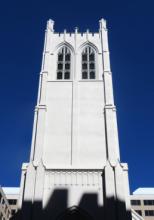
Who are the mainline Protestants today? Vintage Protestants? The VPCC — Vanishing Progressive Christian Church? The Legacy Church?
Half a century ago, the denominations under the mainline umbrella dominated the American faith landscape. Now, after decades of declining numbers, only about one in five U.S. adults identifies with a mainline denomination such as United Methodists, the Episcopal Church, the Evangelical Lutheran Church in America, Presbyterian Church (USA), and American Baptists.
Could replacing the “mainline” name help stem the slide? The challenge came from scholar and Presbyterian pastor Carol Howard Merritt. Writing in the venerable Christian Century magazine, she called for a new brand that conveys her view of the mainline’s rising diversity and social justice leadership.
